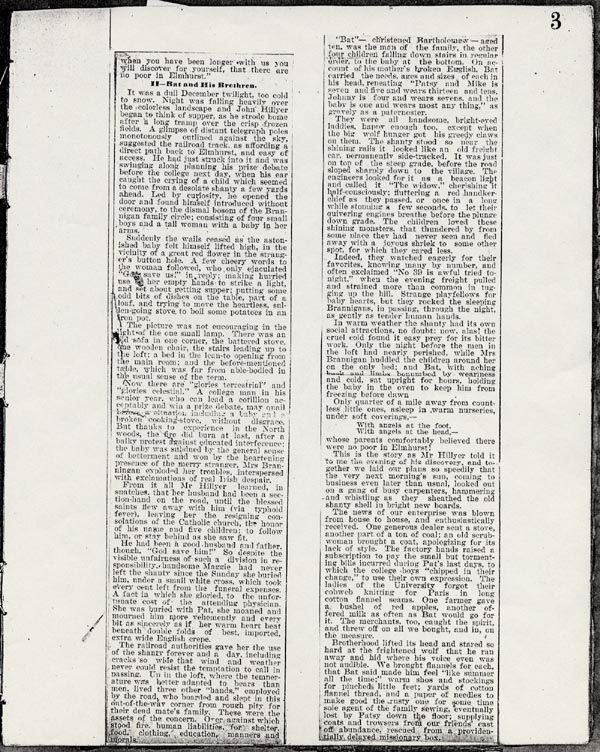Manuscript:

Transcription:
[ right column ]
"Bat" - christened Bartholomew - aged
ten, was the man of the family, the other
four children falling down stairs in regular
order, to the baby at the bottom. On ac-
count of his mother's broken English, Bat
carried the needs, ages and sizes of each in
his head, repeating "Patsy and Mike is
seven and five and wears thirteen and tens.
Johnny is four and wears sevens, and the
baby is one and wears most any thing," as
gravely as a paternoster.
They were all handsome, bright-eyed
laddies, happy enough too, except when
the big wolf hunger got his greedy claws
on them. The shanty stood so near the
shining rails it looked like an old freight
car, permanently side-tracked. It was just
on top of the steep grade, before the road
sloped sharply down to the village. The
engineers looked for it as a beacon light
and called it "The widow," cherishing it
half-consciously; fluttering a red handker-
chief as they passed, or once in a long
while stopping a few seconds, to let their
quivering engines breathe before the plunge
down grade. The children loved these
shining monsters, that thundered by from
some place they had never seen and fled
away with a joyous shriek to some other
spot, for which they cared less.
Indeed, they watched eagerly for their
favorites, knowing many by number, and
often exclaimed "No 39 is awful tried to-
night," when the evening freight pulled
and strained more than common in tug-
ging up the hill. Strange playfellows for
baby hearts, but they rocked the sleeping
Brannigans, in passing, through the night,
as gently as tender human hands.
In warm weather the shanty had its own
social attractions, no doubt; now, alas! the
cruel cold found it easy prey for its bitter
work. Only the night before the men in
the loft had nearly perished, while Mrs
Brannigan huddled the children around her
on the only bed; and Bat, with aching
back and limbs benumbed by weariness
and cold, sat upright for hours, holding
the baby in the oven to keep him from
freezing before dawn
Only quarter of a mile away from count-
less little ones, asleep in warm nurseries,
under soft coverings, -
With angels at the foot,
With angels at the head, -
With angels at the head, -
whose parents comfortably believed there
were no poor in Elmhurst!
This is the story as Mr Hillyer told it
to me the evening of his discovery, and to-
gether we laid our plans so speedily that
the very next morning's sun, coming to
business even later than usual, looked out
on a gang of busy carpenters, hammering
and whistling as they sheathed the old
shanty shell in bright new boards.
The news of our enterprise was blown
from house to house, and enthusiastically
received. One generous dealer sent a stove,
another part of a ton of coal; an old scrub-
woman brought a coat, apologizing for its
lack of style. The factory hands raised a
subscription to pay the small but torment-
ing bills incurred during Pat's last days, to
which the college boys "chipped in their
change," to use their own expression. The
ladies of the University forgot their
cobweb knitting for Paris in long
cotton flannel seams. One farmer gave
a bushel of red apples, another of-
fered milk as often as Bat would go for
it. The merchants, too, caught the spirit,
and threw off on all we bought, and in, on
the measure.
Brotherhood lifted its head and stared so
hard at the frightened wolf that he ran
away and hid where his voice even was
not audible. We brought flannels for each,
that Bat said made him feel "like summer
all the time;" warm shos [sic] and stockings
for pinched little feet; yards of cotton
flannel thread, and a paper of needles to
make good the rusty one for some time
sole agent of the family sewing, eventually
lost by Patsy down the floor; supplying
coats and trowsers from our friends' cast
off abundance, rescued from a providen-
tially delayed missionary box.



